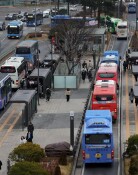Deans Association Opposes PCJRs Bill on Law Schools
Deans Association Opposes PCJRs Bill on Law Schools
Posted May. 17, 2005 22:52,
A plan limiting the number of students who are allowed to enter three-year law school programs (professional graduate schools for law), which is scheduled to be introduced in 2008, will set the number of students at 150 per law school. Co-law schools set up by over two universities will not be permitted.
The Presidential Committee on Judicial Reform (co-chaired by Prime Minister Lee Hae-chan and lawyer Han Seung-hun) (PCJR) stated on May 17 that it held a general meeting yesterday to decide on a bill on law school establishment and management, including the above, and that it would submit the bill to the National Assembly soon.
Although the PCJR did not decide on the total number of students entering law schools separately, since most of the commissioners of the PCJR have agreed to base the intake quota of law schools (at an early stage of the law school system) on the total number of people who passed the then national bar exam, total enrollment is highly likely to be around 1,200. The current national bar exam will be abolished in 2013.
The PCJR also decided on a measure that instead of extending the range of cases currently allowed applying for the procedure in which an accuser directly requests a judgment from a court in case the prosecution rejects a case by the accuser, those cases (encompassing all kinds of crimes) must undergo an appeal from the prosecution.
The Nationwide Law Colleges Deans Association (chairman: Lee Young-jun, dean of the law department at Kyunghee University) and the Nationwide Professors Association for the Reform of Law Education (chairman: Lee Seung-ho, dean of the law department at Konkuk University) issued a statement on the same day, however, saying, We oppose the PCJRs bill on the introduction of law schools since it was planned as a way just to maintain the Bars vested rights.
They insisted, Since the bill drawn up by the PCJR has been made unilaterally by some legal experts without gathering public opinion, it is a rough-and-ready bill that has serious defects in its procedures, as well as grave legal errors in its content.
In the meantime, regarding the revision of the Criminal Procedure Code that has stirred up a strong backlash from the prosecution, the PCJR is planning to decide on it at a general conference to be held in July after passing it at a working-level meeting to be held in June.
jin0619@donga.com







